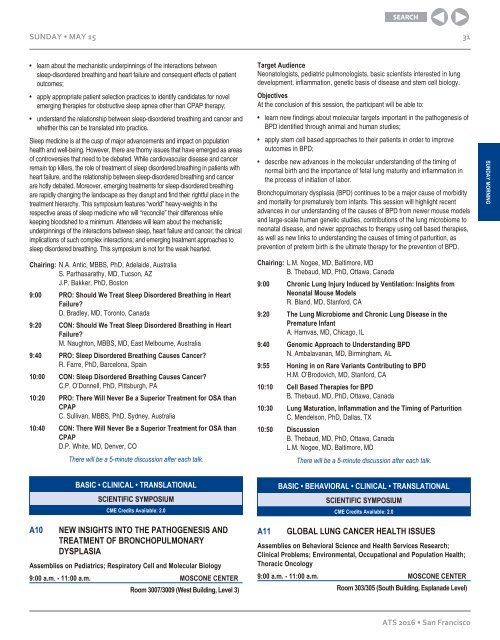Final Program
4njPuP
4njPuP
Create successful ePaper yourself
Turn your PDF publications into a flip-book with our unique Google optimized e-Paper software.
SUNDAY • MAY 15 31<br />
• learn about the mechanistic underpinnings of the interactions between<br />
sleep-disordered breathing and heart failure and consequent effects of patient<br />
outcomes;<br />
• apply appropriate patient selection practices to identify candidates for novel<br />
emerging therapies for obstructive sleep apnea other than CPAP therapy;<br />
• understand the relationship between sleep-disordered breathing and cancer and<br />
whether this can be translated into practice.<br />
Sleep medicine is at the cusp of major advancements and impact on population<br />
health and well-being. However, there are thorny issues that have emerged as areas<br />
of controversies that need to be debated. While cardiovascular disease and cancer<br />
remain top killers, the role of treatment of sleep disordered breathing in patients with<br />
heart failure, and the relationship between sleep-disordered breathing and cancer<br />
are hotly debated. Moreover, emerging treatments for sleep-disordered breathing<br />
are rapidly changing the landscape as they disrupt and find their rightful place in the<br />
treatment hierarchy. This symposium features “world” heavy-weights in the<br />
respective areas of sleep medicine who will “reconcile” their differences while<br />
keeping bloodshed to a minimum. Attendees will learn about the mechanistic<br />
underpinnings of the interactions between sleep, heart failure and cancer; the clinical<br />
implications of such complex interactions; and emerging treatment approaches to<br />
sleep disordered breathing. This symposium is not for the weak hearted.<br />
Chairing: N.A. Antic, MBBS, PhD, Adelaide, Australia<br />
S. Parthasarathy, MD, Tucson, AZ<br />
J.P. Bakker, PhD, Boston<br />
9:00 PRO: Should We Treat Sleep Disordered Breathing in Heart<br />
Failure?<br />
D. Bradley, MD, Toronto, Canada<br />
9:20 CON: Should We Treat Sleep Disordered Breathing in Heart<br />
Failure?<br />
M. Naughton, MBBS, MD, East Melbourne, Australia<br />
9:40 PRO: Sleep Disordered Breathing Causes Cancer?<br />
R. Farre, PhD, Barcelona, Spain<br />
10:00 CON: Sleep Disordered Breathing Causes Cancer?<br />
C.P. O’Donnell, PhD, Pittsburgh, PA<br />
10:20 PRO: There Will Never Be a Superior Treatment for OSA than<br />
CPAP<br />
C. Sullivan, MBBS, PhD, Sydney, Australia<br />
10:40 CON: There Will Never Be a Superior Treatment for OSA than<br />
CPAP<br />
D.P. White, MD, Denver, CO<br />
There will be a 5-minute discussion after each talk.<br />
Target Audience<br />
Neonatologists, pediatric pulmonologists, basic scientists interested in lung<br />
development, inflammation, genetic basis of disease and stem cell biology.<br />
Objectives<br />
At the conclusion of this session, the participant will be able to:<br />
• learn new findings about molecular targets important in the pathogenesis of<br />
BPD identified through animal and human studies;<br />
• apply stem cell based approaches to their patients in order to improve<br />
outcomes in BPD;<br />
• describe new advances in the molecular understanding of the timing of<br />
normal birth and the importance of fetal lung maturity and inflammation in<br />
the process of initiation of labor.<br />
Bronchopulmonary dysplasia (BPD) continues to be a major cause of morbidity<br />
and mortality for prematurely born infants. This session will highlight recent<br />
advances in our understanding of the causes of BPD from newer mouse models<br />
and large-scale human genetic studies, contributions of the lung microbiome to<br />
neonatal disease, and newer approaches to therapy using cell based therapies,<br />
as well as new links to understanding the causes of timing of parturition, as<br />
prevention of preterm birth is the ultimate therapy for the prevention of BPD.<br />
Chairing: L.M. Nogee, MD, Baltimore, MD<br />
B. Thebaud, MD, PhD, Ottawa, Canada<br />
9:00 Chronic Lung Injury Induced by Ventilation: Insights from<br />
Neonatal Mouse Models<br />
R. Bland, MD, Stanford, CA<br />
9:20 The Lung Microbiome and Chronic Lung Disease in the<br />
Premature Infant<br />
A. Hamvas, MD, Chicago, IL<br />
9:40 Genomic Approach to Understanding BPD<br />
N. Ambalavanan, MD, Birmingham, AL<br />
9:55 Honing in on Rare Variants Contributing to BPD<br />
H.M. O’Brodovich, MD, Stanford, CA<br />
10:10 Cell Based Therapies for BPD<br />
B. Thebaud, MD, PhD, Ottawa, Canada<br />
10:30 Lung Maturation, Inflammation and the Timing of Parturition<br />
C. Mendelson, PhD, Dallas, TX<br />
10:50 Discussion<br />
B. Thebaud, MD, PhD, Ottawa, Canada<br />
L.M. Nogee, MD, Baltimore, MD<br />
There will be a 5-minute discussion after each talk.<br />
SUNDAY MORNING<br />
A10<br />
BASIC • CLINICAL • TRANSLATIONAL<br />
SCIENTIFIC SYMPOSIUM<br />
CME Credits Available: 2.0<br />
NEW INSIGHTS INTO THE PATHOGENESIS AND<br />
TREATMENT OF BRONCHOPULMONARY<br />
DYSPLASIA<br />
Assemblies on Pediatrics; Respiratory Cell and Molecular Biology<br />
9:00 a.m. - 11:00 a.m. MOSCONE CENTER<br />
Room 3007/3009 (West Building, Level 3)<br />
A11<br />
BASIC • BEHAVIORAL • CLINICAL • TRANSLATIONAL<br />
SCIENTIFIC SYMPOSIUM<br />
CME Credits Available: 2.0<br />
GLOBAL LUNG CANCER HEALTH ISSUES<br />
Assemblies on Behavioral Science and Health Services Research;<br />
Clinical Problems; Environmental, Occupational and Population Health;<br />
Thoracic Oncology<br />
9:00 a.m. - 11:00 a.m. MOSCONE CENTER<br />
Room 303/305 (South Building, Esplanade Level)<br />
ATS 2016 • San Francisco


